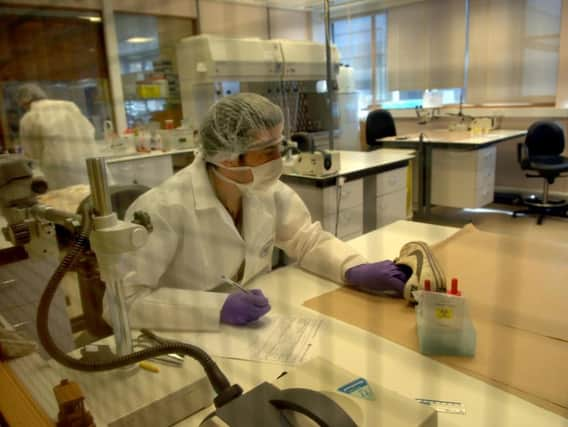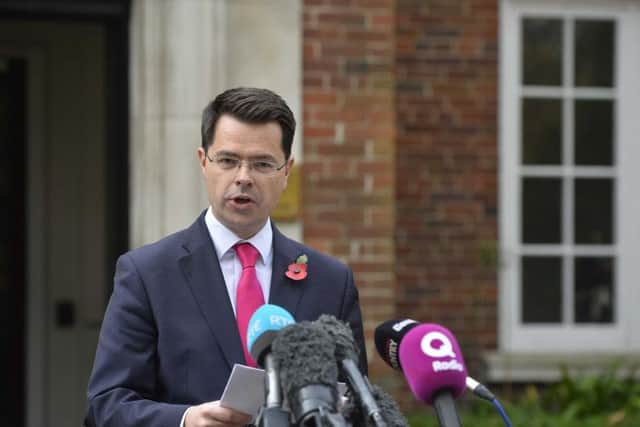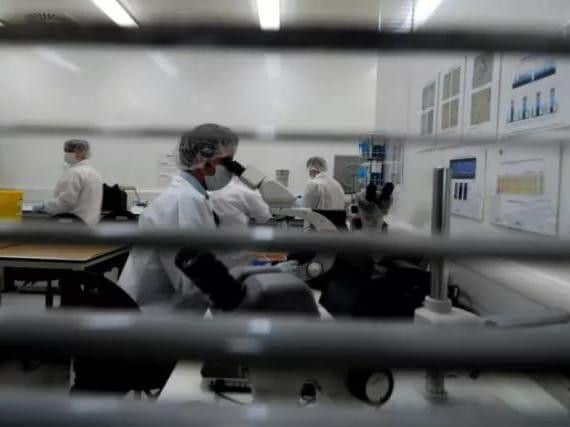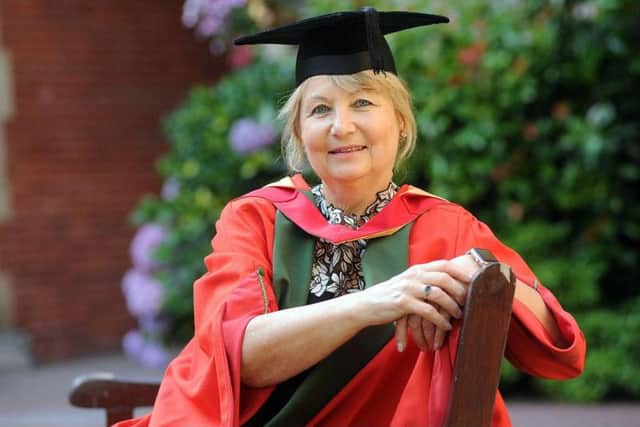Privatisation in the dock over 'the biggest forensic science scandal for decades'


While most successful crime dramas rely on unexpected twists, many forensic scientists watching the growing scandal unfolding in their field may feel the situation is unfortunately all-too-predictable.
When then-Home Office minister James Brokenshire announced in December 2010 that the Government’s Forensic Science Service was to be closed down, he suggested greater use of private sector providers would see serious crimes solved more quickly and efficiently as companies fought to provide “innovative services at the lowest cost”.
Advertisement
Hide AdAdvertisement
Hide AdBut this was not a viewed shared by the majority of forensic scientists at the time; a survey conducted by the New Scientist magazine found over 90 per cent of them - including those already working in the private sector - thought the closure would have a negative effect, with three-quarters believing it would lead to an increase in miscarriages of justice.


Now seven years on, a growing ‘data manipulation’ scandal involving samples which were evidence in more than 10,000 criminal cases across the country has already seen two convictions for road deaths referred to the Court of Appeal and around 50 prosecutions for drug-driving discontinued. Cases involving violent crime, sexual offences and unexplained deaths are among those now in doubt.
The scandal which initially involved the Manchester-based firm Randox Testing Services has also spread from the criminal to the civil field, with the same manipulation feared to have occurred in child protection and family court cases at a now-defunct company called Trimega, which was twice publicly criticised by judges for incorrect results affecting care proceedings before it collapsed into administration in 2014.
The full retesting programme on the affected criminal samples - including almost 2,000 cases in Yorkshire - is expected to take up to three years to complete. It has separately been admitted the true scale of the problem involving Trimega is unlikely to ever be known because of “poor record-keeping” at the company.
Advertisement
Hide AdAdvertisement
Hide AdIn West Yorkshire alone, the small number of criminal cases to be reviewed so far has uncovered some cases where people convicted of drug or drink-driving offences were subsequently found to have results that were actually under the legal limit. A further 13 cases have been dropped before prosecution.


Investigations are still ongoing after two people who worked at both companies were arrested earlier this year but the situation has re-ignited the debate around how forensic services are delivered in this country.
And the search for a culprit is getting political; Labour has suggested “the biggest forensic science scandal for decades [...] flows directly from the misconceived decision to privatise the Forensic Science Service”, while Conservative minister Nick Hurd insists regulatory standards have improved and Labour is cynically using the issue in an attempt to turn it into a political narrative around “public good, private bad”.
The FSS pioneered the use of DNA profiling and employed around 1,600 people across seven sites, including in Wetherby. In December 2005, FSS became a Government-owned company in an attempt to make it more competitive with its commercial rivals. But by the time of the closure announcement, FSS was said to be losing £2m a month and it was closed in March 2012.
Advertisement
Hide AdAdvertisement
Hide AdSteve Thomas, national secretary of the Prospect union, fought to save FSS in his then-role as the trade union officer for the service. In 2011, he gave evidence to MPs on the Science and Technology Committee and raised his own concerns about the potential for miscarriages of justice.


The committee’s own report subsequently warned it was concerned “the wider impacts to the criminal justice system appear to have been hastily overlooked in favour of the financial bottom line”.
But Thomas says today that while problems were foreseeable, even he is surprised by the scale of alleged data manipulation that has come to light. “This is worst-case scenario stuff,” he says. “To me, the biggest issue is confidence in the criminal justice system. It is people’s livelihoods and liberty that are at risk from this scandal. I don’t think it would have happened if there had continued to be a publicly-funded service.”
Thomas says the closure decision failed to take full account of the difficulties in running forensics services for profit, as well as the loss of skilled scientists. He says he thinks the current scandal should be seen by the Government as an opportunity to give serious consideration to restarting a publicly-funded organisation.
Advertisement
Hide AdAdvertisement
Hide Ad“I wouldn’t say I’m optimistic or hopeful that the will can be found. But given the seriousness of the situation and the fragility of the market which doesn’t seem to be working, the Government may see the decision to close FSS was foolhardy and start to give serious consideration to having a publicly-funded organisation. But I don’t think that is going to happen.


“Forensics is incredibly important and effective way of providing evidence to the courts. But if convictions are unsafe, the effect on defendants is catastrophic and it is the same for victims of crime if a case can’t progress. The wider concern is for the integrity of the criminal justice system - it is hard to put a price on that.”
However, Angela Gallop, one of the country’s most distinguished forensic scientists involved in helping secure the evidence that resulted in the convictions of Stephen Lawrence and Damilola Taylor’s killers, says changes to the forensics market are needed - but bringing back a state-run organisation like the FSS is not the answer.
The FSS itself was no stranger to controversy - in 2005, an investigation called Operation Cube was launched to review thousands of cases where officials from the FSS were said to have used the wrong procedures when testing for microscopic traces of DNA.
Advertisement
Hide AdAdvertisement
Hide AdProfessor Gallop started her career at the FSS in the 1970s before going on to establish her own companies in the private sector from the 1980s onwards. The first, Forensic Access, helped defence lawyers have access to the same levels of forensic expertise as prosecutors for the first time, while her next firm Forensic Alliance made its name solving ‘cold case’ murders where killers had escaped for justice for years.
Gallop says she disagreed with the closure of the FSS because of the loss of well-qualified scientists it entailed but says the arrival of private sector competition for the FSS in the 1990s had been a positive thing.
“The advantages of a private market far outweighs the disadvantages. If you look at where we were in the 1990s before the market opened up we had a massive backlog of cases. The FSS more or less had a monopoly and it dictated to the police what they had and when they had it because it was only them.


"It got so bad when investigators wanted a DNA result even in a murder cases, it would take months. I think eight months was the standard wait at one stage. That is so unacceptable.
Advertisement
Hide AdAdvertisement
Hide Ad“The big change was when budgets were devolved to individual forces and they could commission what they wanted. That is when the market opened up.”
Gallop says she would be “very surprised” if the issues uncovered at Randox and Trimega are more widespread across the industry and says public confidence in private forensics firms should not be shaken.
But she does believe that changes are needed - both in terms of ensuring forensics firms which provide services to defence lawyers are accredited to the same standard as those which support prosecutors, and making more money available for defence reviews to be conducted.
She says allowing more defence reviews of prosecution forensic evidence could act as an important “safety net” for the justice system. “Such reviews are done but have always been the Cinderella of forensic science. It comes through legal aid and has always been underfunded.”
Advertisement
Hide AdAdvertisement
Hide AdShe says another issue is police forces increasingly doing their own work in-house, which has contributed to reducing the value of the private market from around £200m a year to about £60m and raises ethical questions. Gallop says there are new models emerging which more successfully combine independent forensics within police investigations which should be explored more widely.
“You have got the police who are heavily involved in investigating and prosecuting now supposed to be providing independent forensic evidence. Even if it is fine, it doesn’t feel right. There probably needs to be a public debate about that.”
Shadow Policing Minister and Labour MP for Sheffield Heeley Louise Haigh says the scandal has left the Home Office with difficult questions to answer.
“It is clear the chaotic reorganisation of forensics, including the closure of the Forensic Science Service, left providers who were simply not fit for purpose to fill the gap. This has had devastating consequences.
Advertisement
Hide AdAdvertisement
Hide Ad"Public confidence will be badly shaken by this scandal. The Government need to get a grip and end the light touch regulation of forensics."
Scandal firm says it should be treated as whistle-blower
The firm at the centre of the data manipulation scandal has said it acted as “whistle-blower” by immediately alerting authorities when it discovered evidence of alleged improper practice.
Randox Testing Services toxicology manager Dr Mark Piper said: “We have acted as whistle-blower to ensure the integrity of the criminal justice system. We will continue to work with Greater Manchester Police and the appropriate authorities.
"We will do all that we can to ensure this situation is resolved and deeply regret the distress that has been caused. We are now well-advanced in developing a fool-proof testing system which would enhance the security of our operations in the future, to provide the necessary level of confidence.”
Advertisement
Hide AdAdvertisement
Hide AdThe company has also stressed there is “no connection” between it and Trimega.
Trimega went into administration in April 2014 and Randox moved into its vacant premises and purchased some of its lab equipment from administrators KPMG, as well as employing “a small number of former Trimega staff”, two of whom were dismissed by Randox after the alleged data manipulation was uncovered.